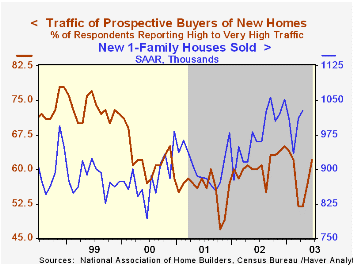 Global| Jun 16 2003
Global| Jun 16 2003Empire State Factory Survey Higher
by:Tom Moeller
|in:Economy in Brief
Summary
The Empire State Manufacturing Survey index of general business conditions rose to the highest level in the survey's brief two year history. The rise to 26.8 in June added 16 points to the even sharper improvement in May. Consensus [...]

The Empire State Manufacturing Survey index of general business conditions rose to the highest level in the survey's brief two year history. The rise to 26.8 in June added 16 points to the even sharper improvement in May.
Consensus expectations for a reading of 10.1. The data were reported by the Federal Reserve Bank of New York.
Diffusion indexes for most subgroups improved with orders, shipments and unfilled orders each moving into positive territory and thus suggesting positive growth. Conversely, the index of employment fell back into negative territory.
The index of prices paid fell sharply for the second month to -2.06, the first negative reading since February 2002.
The survey includes measures of business expectations six months ahead. This diffusion index for general business conditions added to the sharp gains of the prior two months. The rise to 58.4 was to the highest level since June of last year. Expectations for capital expenditures fell and gave back much of the strong May gain.
The Empire State Manufacturing Survey is a monthly survey of manufacturers in New York State conducted by the Federal Reserve Bank of New York. Participants from across the state in a variety of industries respond to a questionnaire and report the change in a variety of indicators from the previous month. Respondents also state the likely direction of these same indicators six months ahead. April 2002 is the first report, although survey data date back to July 2001.
Like the Philadelphia Fed Index of General Business Conditions, the Empire State Business Conditions Index reflects answers to an independent survey question, not the components.
For the latest Empire State Manufacturing Survey report, click here.
| Empire State Manufacturing Survey | June | May | Y/Y | 2002 | 2001 |
|---|---|---|---|---|---|
| General business conditions (diffusion index) | 26.8 | 10.6 | 10.31 | 7.10 | -13.02 |
by Tom Moeller June 16, 2003

The National Association of Home Builders (NAHB) reported that their Composite Housing Market Index rose five points in June to 62. The gain added to a five point rise in May and pulled the index back into the lofty range prevalent before the War with Iraq.
During the last fifteen years there has been a 69% correlation between the y/y change in the NAHB index and the change in new home sales.
The index of current market conditions for home sales rose as the percentage of builders indicating "good" conditions rose to 47% from 44%.
The index which measures expected home sales in six months rose to 70 versus an average of 69 during all of last year.
Traffic of prospective buyers again rose sharply to the average of last year.
The NAHB index is a diffusion index based on a survey of builders. Readings above 50 signal that more builders view conditions as good than poor.
For a description of the housing market index from the National Association of Home Builders, visit the NAHB website.
| Nat'l Association of Home Builders | June | May | Y/Y | 2002 | 2001 | 2000 |
|---|---|---|---|---|---|---|
| Composite Housing Market Index | 62 | 57 | 60 | 61 | 56 | 62 |
Tom Moeller
AuthorMore in Author Profile »Prior to joining Haver Analytics in 2000, Mr. Moeller worked as the Economist at Chancellor Capital Management from 1985 to 1999. There, he developed comprehensive economic forecasts and interpreted economic data for equity and fixed income portfolio managers. Also at Chancellor, Mr. Moeller worked as an equity analyst and was responsible for researching and rating companies in the economically sensitive automobile and housing industries for investment in Chancellor’s equity portfolio. Prior to joining Chancellor, Mr. Moeller was an Economist at Citibank from 1979 to 1984. He also analyzed pricing behavior in the metals industry for the Council on Wage and Price Stability in Washington, D.C. In 1999, Mr. Moeller received the award for most accurate forecast from the Forecasters' Club of New York. From 1990 to 1992 he was President of the New York Association for Business Economists. Mr. Moeller earned an M.B.A. in Finance from Fordham University, where he graduated in 1987. He holds a Bachelor of Arts in Economics from George Washington University.
More Economy in Brief
 Global| Feb 05 2026
Global| Feb 05 2026Charts of the Week: Balanced Policy, Resilient Data and AI Narratives
by:Andrew Cates






